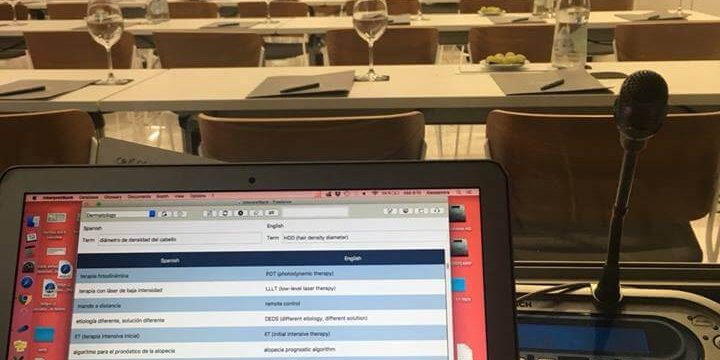Last week Specialized Translators provided a four-day Spanish-into-English simultaneous interpreting service during a technical conference on dermatology in Calpe (Alicante, Spain).
Whoever is familiar with this field is aware of its complexity: when you speak of derma products it’s not just about marketing, you have to deal with complex medical and chemical concepts, together with its terminology.
This is why time is not your best friend when the client requests the service last minute on a Thursday evening to confirm it on Friday morning and the assignment starts on Monday.
Preparation is key before each interpreting assignment
We interpreters need to study before each event. We are not born experts of all fields of human knowledge. Plus, the more technical the assignament is, the more we have to study. As simple as that. And even when you have previous experience on the same topic, each company is a different world in terms of products, active ingredients they use for them and so on.
In addition, fellow interpreters can confirm that once the assignment is over, your memory needs to get rid of all those terms you had to recall in another language in a matter of a second or less for the previous assignment. This is why unless you interpret each week about the same topic, you need to study again the material you had previously prepared for a related assignment.
It’s essential that the client understands the importance of providing plently of documentation on what speakers will talk about (mainly the PPTs that are going to be displayed). This is the best way for us interpreters to optimize our preparation before the event and ensure the best performance on the days of the conference.

How we prepared in this case
In this particular case, we couldn’t waste any time waiting for the documents since we weren’t sure if and when we would get them. This is why we spent the entire weekend preparing: we read each and every section of the client’s website, extracted all the technical terms we might need during the conference, included them in a glossary together with the equivalents in the target language, apart from studying all revelant concepts we might have to deal with. By Saturday at 3 pm, our draft glossary had already 450 terms, and that’s when we received the first PPTs from the client. By the end of the process, the glossary reached 800 terms, most of which where active ingredients and long chemical compounds, which were extremely hard to even read (sometimes even by the experts themselves, that was reassuring for us).
Of course, having 800 terms in written in your glossary is not enough. You need to memorize them so that whenever they come up in the talk, you’ll be able to immediately recall the equivalent term in the target language.

When you study hard, there is always a happy ending
Personally, even though I always get the impression that there is no way my memory can cope with so much terminology in a short amount of time while preparing, when the microphone is on on the big day, the magic simply happens: thanks to the adrenaline of the assignment combined with the long hours of preparation, I somehow manage to find the right term at the right time stored somewhere in my busy brain.
For more pictures of the event, you can check our Facebook page.







